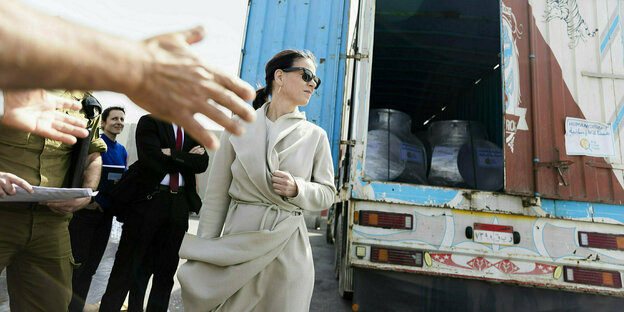When it comes to addressing the humanitarian situation in the Middle East, Germany is not living up to its own standards. Feminist approaches are difficult to recognize.

Foreign Minister Annalena Baerbock in front of the Kerem Shalom border crossing with the Gaza Strip at the end of March. Photo: Christoph Soeder/dpa
The federal government wants to pursue a feminist foreign policy. For a year now, the Foreign Ministry's guidelines have specified what this should look like. However, there is little evidence of feminist approaches in addressing the humanitarian catastrophe in Gaza as a result of the Hamas massacre on October 7 and Israel's subsequent and ongoing war in Gaza.
The effects on civilians are catastrophic. More than 30,000 people have already died, most of them women and children. According to the UN, about 180 women give birth every day in the war zone. Due to lack of medical care, cesarean sections are sometimes performed without anesthesia and postnatal care is almost impossible. Malnutrition and dehydration in the face of the growing hunger crisis are particularly fatal for newborns and children, the elderly and the sick. Civil society in the region and around the world is tirelessly pointing this out and demanding that the federal government change course and return to its claim of feminist policy.
There are many starting points for this: the demand for an immediate humanitarian ceasefire. Increased public support for negotiations to free Israeli hostages. Prosecuting and documenting human rights violations and sexual violence, protecting sexual and reproductive health in war zones, and providing immediate humanitarian aid in the face of worsening famine and human security crises.
Implement women's participation.
In short: focus on protecting the people affected. Feminist approaches not only think of security as the stability of states, but also focus on the well-being of the individual. Above all, the focus is on those whose perspectives continue to receive less consideration in traditional foreign policy. This applies, for example, to women, children and groups that are structurally discriminated against on sexual, religious, ethnic or other grounds.
Therefore, the Ministry of Foreign Affairs has defined the goal of German feminist foreign policy as strengthening their rights, enabling the fair distribution of resources, and implementing the participation of women and other marginalized groups. But the way the war in Gaza is being handled seems to contradict these principles.
Strengthening rights would mean protecting the human rights of those affected and strengthening international law. To alleviate the humanitarian emergency on the ground, an immediate humanitarian ceasefire is indicated.
Feminist organizations are structurally underfunded
In this sense, Germany hesitated too much for too long and abstained from voting in the United Nations General Assembly vote in December 2023. From a human rights perspective, arms exports to Israel are also problematic, just as than the lifting of the ban on exports to Saudi Arabia.
Looking at resources means, above all, humanitarian aid on the necessary scale. Although Germany has increased payments, the interruption of payments to the Palestinians is exacerbating the people's suffering. Beyond humanitarian aid, it is about supporting actors and organizations that are committed to political and peaceful solutions. Feminist and women's rights organizations in particular lack structural funding and therefore have less room for maneuver.
In the spirit of participation and representation, this is primarily about the inclusion of feminist and women's rights organizations from the Israeli and Palestinian contexts. Because those affected are not only victims, but also experts in their situation. Therefore, they should participate in resolving conflicts as much as those who caused them. This is the only way to incorporate local perspectives, needs and knowledge, which have been shown to lead to more sustainable, stable and comprehensive results. And that's exactly what's wrong.
The gap between feminist claims and reality is certainly noticeable abroad, especially as German discourse repeatedly gets caught up in navel-gazing. Instead of discussions about possible solutions, internal political debates predominate, as happened recently at the Berlinale.
Those affected are not only victims, but also experts in their situation
As a result, Germany is becoming increasingly isolated from civil society in the region. Actors who were once sympathetic to the concept are walking away in disappointment. Organizations reject funding for German projects and scientists reject invitations to Germany, partly as a simple boycott, partly out of fear of not being able to express themselves in German discourse without consequences for their professional and private lives. A problem for a policy that depends on local experience.
When it comes to this human security catastrophe on both sides, this self-created isolation is fatal. The federal government would do well to bring together regional feminist experts with civil society voices to work together on solutions. Especially since alleviating the humanitarian crisis is a necessary condition to confront the political crisis.
With the guidelines of a feminist foreign policy, German foreign policy has committed itself to an ambitious and promising concept. You would benefit from checking this out.